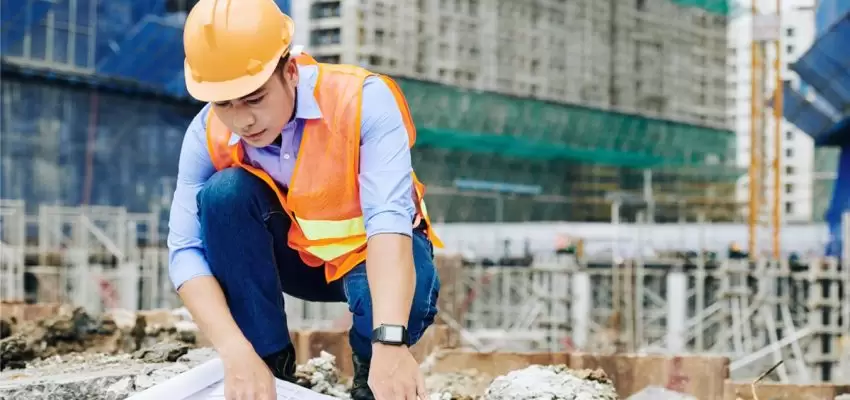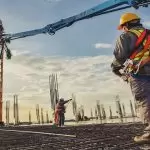When undertaking any construction work, it is either a residential build or commercial development and infrastructure that may have just started with the process; therefore, getting the right civil contractor on board becomes essential. Construction has lately become such a fast-emerging sector; therefore, more professionals in this industry are more in demand now than at any other time. Here’s how you can learn the best things to know when hiring civil contractors by reading further in this blog.
Post your Requirement
Who Are Civil Contractors And What Do They Do?
Before we delve into the selection process, it is important to understand who civil contractors are and what they do. Civil contractors are professionals responsible for executing various construction projects, which may include buildings, roads, bridges, and other infrastructure. They manage all aspects of a project, from initial planning and design to execution and final inspection.
Key Considerations For Choosing Civil Contractors
1. Experience And Reputation
The first point to look for in choosing civil contractors is experience and reputation. It may go a long way in dictating the quality and even the success of your project.
- Portfolio: Review their previous work to understand their capabilities and expertise. A well-documented portfolio that shows completed projects similar to yours can give you confidence in their capabilities. Look for diversity in their projects to ensure they can handle different challenges.
- References: Ask previous clients to refer you. Contact those references to hear about their experience and what they feel about the reliability of the contractor. Ask specific questions to the client about communication with the contractor, timeline management, and overall satisfaction with the job done.
- Online Reviews: Check online websites for reviews and ratings. Google, Yelp, or industry-specific forums can give you very good feedback about the contractor’s performance. Keep an eye on both the negative and positive reviews so that you can balance the strengths and weaknesses.
2. Licensing And Insurance
Check if the civil contractors you are considering have full licensing and insurance coverage. This is a critical step in protecting yourself from possible liabilities.
- Licensing: A license shows that a person is fit to participate in that operation and fits the requirements of the local authorities. Ensure their license is up to date and suitable for your project. Since different types of construction will require different licenses, ensure they have it all.
- Insurance: Find out if they have liability coverage and worker’s compensation, which will bar you from being sued if there is an accident or damage during the construction process. Ask for their copies of insurance certificates and ensure that the coverage is sufficient for your construction project.
3. Knowledge In Civil Work
Different projects require different skills. If your project deals with civil engineering work, ensure that you are picking contractors who have skills in civil work.
- Applicable Experience: Choose a contractor who has done similar jobs successfully. Their experience would help you overcome potential challenges and assure quality. For example, if you are developing a road, choose a contractor who has worked on previous road development projects. Such a contractor would know how to handle the problems in the process.
- Knowledge of Local Regulations: Being aware of the local building codes and zoning laws could help a contractor make your permitting process easy and ensure compliance. It is to their benefit to know all environmental regulations that may be relevant to your project, and if any approvals are required they can navigate it easily.
4. Local Knowledge And Presence
Some helpful searches are “civil contractors near me.” Such people will know the local climate much better. This will include knowing which place the zoning laws would direct your building and also where you are related to the local suppliers.
- Connectivity With The Community: People close to you are already familiar with local contractors who make building and construction much more efficient and fast. Connections are easy in case of something amiss, hence, allowing concerns about your project from some residents to arise.
- Local Supply Chains: They may have associations with some local suppliers whereby materials get delivered faster at a slightly cheaper price, which in turn helps not to wait for the materials that the contractors from further areas get delayed due to supply chains.
5. Good Communication Skills
Communication skills are critical in any building project. The contractor has to put the plans of the day, timelines as well as costs in a simpler and comprehensible way.
- Clarity: They should be able to break down complex terms into jargon-free language that allows you to be on the same page all along with the project. The fewer the misunderstandings and clear expectations, the better it is.
- Responsiveness: A good contractor will be able to promptly respond to your questions and keep you abreast of the progress made so far. Assess their communication style in your initial interactions so you can gauge how responsive they will be during the whole project.
6. Financial Stability
Evaluate the financial strength of the civil contractors before you select them. A financially stable contractor is, therefore more likely to deliver your project both within time and budget requirements.
- Financial Statements: Look for financial statements or records showing financial soundness. A financially strong contractor cannot jeopardize your project any longer because of fund troubles in the project. He or she is in such a good financial condition that helps in alleviating all issues arising due to funds delays in the project.
- Supplier References: Asses the supplier references as to whether the contractor pays on time and in good relations with the supplier, which reflects the credibility of the contractor’s financial capability.
7. Specific Proposals And Contracts
Now you shortlist your list and ask your shortlisted civil contractors for specific proposals. A proper specific proposal must have the following;
- Scope of Work: Activities to be carried out, materials to be used, and the time for the project. Well-detailed scope will avoid scope creep and misunderstanding later.
- Cost Estimates: Clear cost breaking down will explain to you where your money is being used and whether there is some hidden cost. Always include contingencies for such eventualities as extra expenditure.
- Payment Schedules: Make sure the payment terms are indicated, showing deposits and other milestone payments. This would help control cash flow as well as relate payments with the level of project execution.
8. Safety Record
Safety is the most important thing that must be kept in mind in a construction project. Learn about the safety policies and training procedures of the contractor.
- Training on Safety: Inquire about the training programs they have for the workers and the seriousness they hold towards the safety measures at the construction site. A company that takes care of safety would have regular training and an elaborate safety plan.
- Accident History: Ask for their record on past accidents and how they were handled. The most important thing a safety record shows is a commitment to protecting workers and the risks associated with the job. Moreover, you can ask if they have experience dealing with OSHA regulations and keeping their projects compliant.
9. Project Management Expertise
Civil construction work may involve complex projects requiring a professional approach to management. Consider contractors who have put processes in place to guide the management of a project.
- Scheduling: A very robust schedule in the project has helped prevent the derailment and, in addition, meeting all milestones in the project. Engage him/her in understanding which tools would help them to schedule and whether such changes are properly updated upon schedule changes and similar other changes.
- Resource Management: The application of the right resources essentially incorporates human, material and physical elements in an optimized way. You need to engage them about any of the resource management strategies that need to be put into place, along with bottle-necks to avoid.
- Quality Control: A good contractor must have quality control measures for his/her work to ensure all of it meets the set requirements. Explain how they check on the site, especially the subcontractors to achieve quality in the work being done.
10. Flexibility And Problem Solving
No construction project will be without its share of problems. Select civil contractors with flexibility and good problem-solving skills.
- Adaptability: The ability to pivot in response to unforeseen circumstances can significantly impact your project’s success. Query the contractor about previous projects where they had to shift or change their plans.
- Innovative Solutions: Contractors who think outside of the box can often resolve problems creatively and cost-effectively. Ask how they will handle unexpected issues and approach finding solutions.
11. Technology and Tools
Today, the use of technology in construction work is more vital than ever. Contractors who use the latest and greatest construction management software and tools can increase efficiency.
- Construction Management Software: Construction management software that offers live updates, budgeting, and project tracking can be used to better communicate and achieve a mutual understanding of matters.
- Tools in Communication: Tools that encourage easier communication between the service providers, the subcontractor, and you so that errors do not arise and put you on the right track to common grounds. Ensure that they make use of applications and/or platforms for every day and periodic updates.
12. Sustainable Practices
If indeed you care much about sustainability, take up civil contractors who keep green practices.
- Sustainable Materials: The contractor should have some knowledge about the “eco-friendly” construction materials and eco-friendly ways in which to minimize any destruction to the environment. Their sourcing process and level of commitment towards sustainable ones could be your question.
- Green Certifications: Always hire a certified contractor who promotes themselves as offering sustainable, healthy, safe, and clean designs. You can differentiate from him/her in the quality along with ethical factors.
13. Post-Construction Support
The end of construction doesn’t have to be the end of your relationship with your civil contractor. Ask what support you can expect post-construction.
- Warranty: A good contractor should offer a warranty on the work, giving you comfort in knowing there is someone you can go to in the future when issues arise. Understand what these warranties are and for how long.
- Maintenance Services: Do they provide maintenance services after completion? This can ensure the work lasts longer. For more massive projects or ones dealing with special systems, this is even more significant.
14. Cost vs. Value
Don’t let the low-bidder win. Measure the value from the contractor.
- Quality of Work: Sometimes the cost is justified by the quality of workmanship done and will save you much in the long run. The cost of hiring a cheap contractor who might cut corners or lack experience.
- Add Service: Some construction companies have extra, value-added services even design assistance or complete control of the project as offered by a contractor and you will find it better, but you must understand both the base cost for performing the job and whether their added services bring significant benefit.
15. Cultural Fit
Lastly, comes in here cultural fit. For more cooperation and fewer headaches doing a project, a positive working relationship with the help of a contractor should be provided.
- Shared Values: A contractor that shares the same vision and values about your project is more vested in your project. Your goals and expectations should also be discussed with them to help you both work in conjunction.
- Work Style Compatibility: Determine if their work style fits your needs and likes on how they communicate as well as interact with your team. When there’s a good fit in regards to culture, it does make for an enjoyable experience and a successful working relationship.
Conclusion
The civil contractor you choose can make or break a project. Whether you know how much experience a company has, or the licenses and qualifications the individuals have, whether they have communication and management at the high level or merely on-site, are some good factors that will guide an informed decision to respect your expectations and needs. Whatever your location, or indeed whatever specific type of civil work contractor you may seek, research and thoughtful analysis of your prospects will indeed pay off.
Money spent in securing the right civil contractors will elevate the quality of your project and facilitate a smoother construction process. So take time, ask questions, and make wise choices for your dream project. Following these guidelines will reassure you that you are in good hands with someone who will ensure the delivery of your vision and bring your project to life.
Read Also: A Comprehensive Guide To Working With Civil Contractors in Delhi NCR























Post A Comment